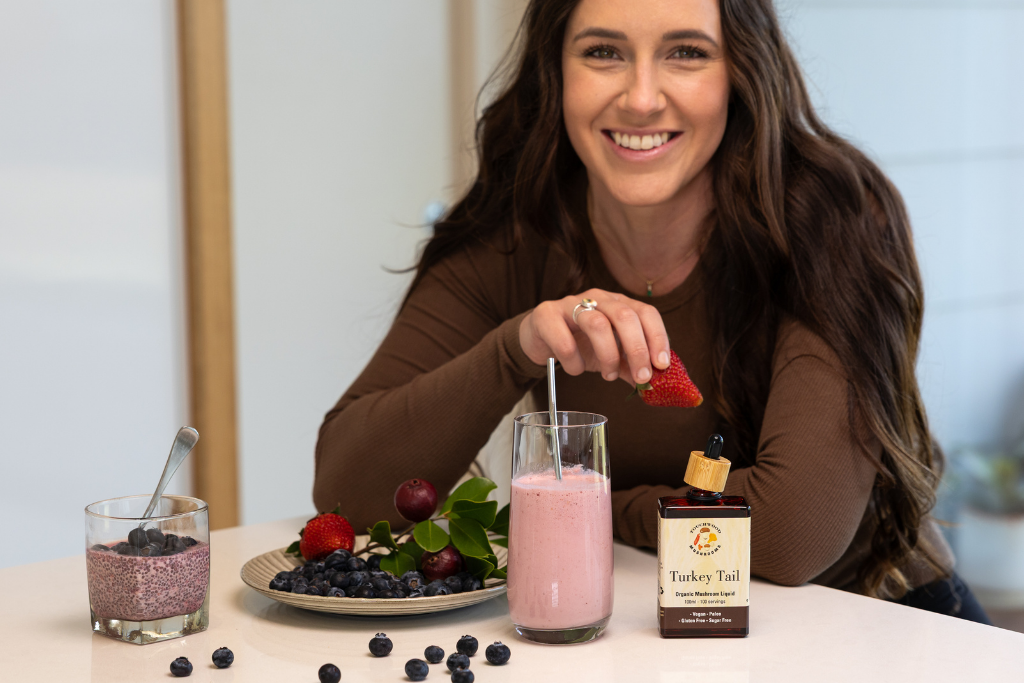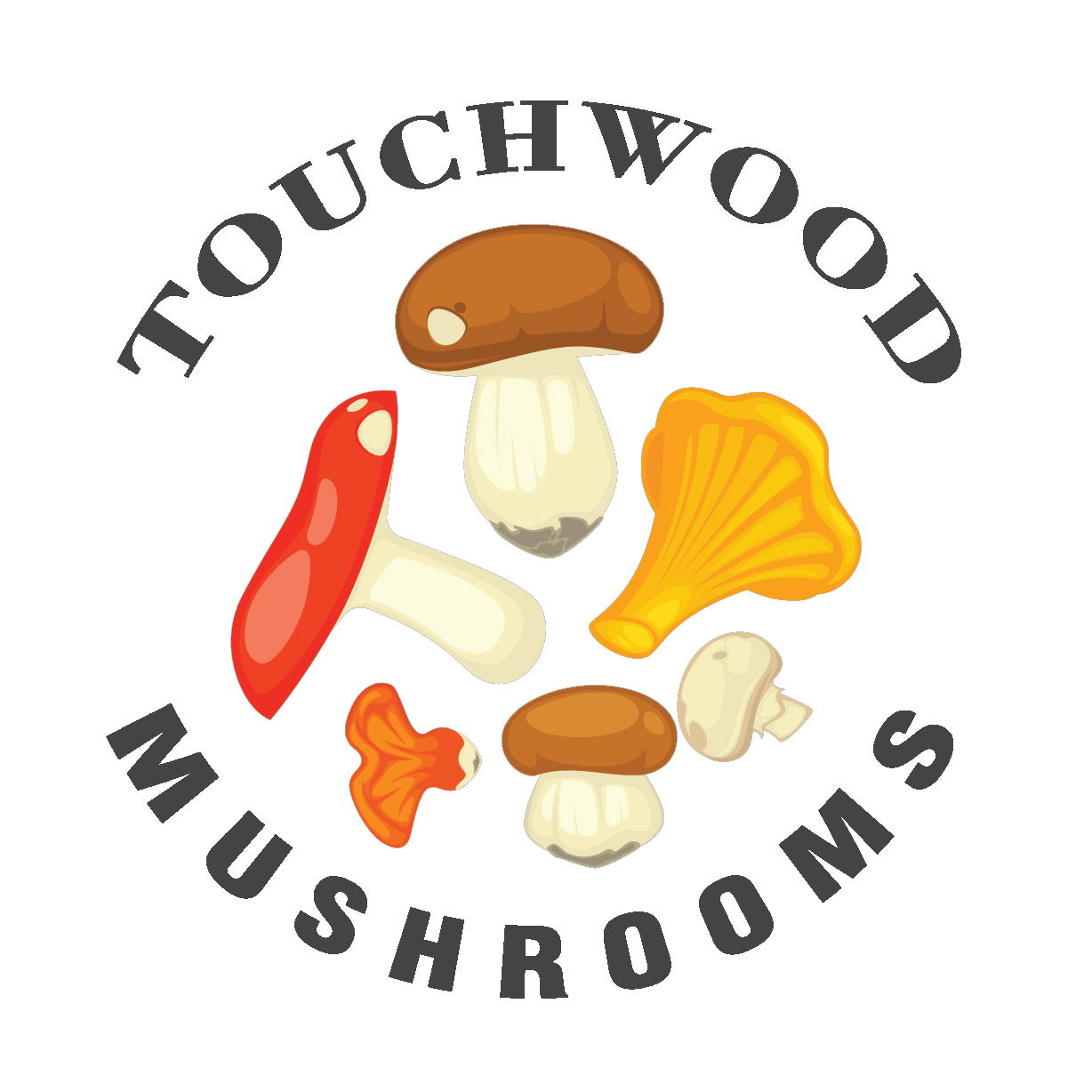
If you’re looking into Turkey Tail mushroom in Australia, chances are you’re looking to enhance your daily routine. Many people turn to Turkey Tail (Trametes versicolor) as part of their broader wellbeing.
Turkey Tail is one of the most researched functional mushrooms in the world. In this guide, we’ll take you through what the science suggests about potential benefits and how to incorporate Turkey Tail extract into your daily routine. We’ll also share what to look for when choosing a functional mushroom extract, based on our expertise and over 50 years of mycological experience.
What is Turkey Tail?
Turkey Tail (Trametes versicolor) is a polypore, the name for mushrooms that have pores on its underside, instead of gills. It grows in a bracket-like arrangement on trees and woody debris and is named for its striking, fan-like shape that resembles a turkey’s tail.
Turkey Tail mushroom grows in temperate forests all over the world, most commonly in Asia and the Americas.
Turkey Tail in traditional medicine
Turkey Tail has a long history of use as a daily ‘tonic’ mushroom across East Asia. In Traditional Chinese Medicine it’s known as Yun Zhi, and in Japanese Kampo as Kawaratake. For centuries it’s been prepared as a tea or dried powder added to soups and congee and taken everyday to support immunity and gut health.
What makes Turkey Tail remarkable?
Turkey Tail is known for its protein-bound polysaccharides, also known as polysaccharopeptides (PSPs). Two of the most well-known polysaccharides that have been identified in Turkey Tail are known as polysaccharopeptide (PSP) and polysaccharide-K (PSK). Research has focused closely on the health benefits of these two Turkey Tail compounds.
Polysaccharide-K (PSK) was first discovered in Japan by a chemical engineer working for Kureha Chemical Industry Co, and was approved for clinical use in 1977 by the Japanese Ministry of Health.
It has been studied extensively for its role in supporting immune health, particularly in oncology.
Polysaccharopeptide (PSP) was isolated by Chinese researchers and approved for clinical use in 1987. Research has focused on its use as immune modulation, gut health and anti-inflammation, as well as an adjunct to standard oncology treatments. A small pilot study in dogs has also shown benefits in the treatment of hemangiosarcoma.
Turkey Tail also contains a number of secondary compounds such as phenolic acids, flavonoids, and terpenoids.

What are the benefits of Turkey Tail Mushroom?
Turkey Tail supports immune health
Research in vitro has shown the bioactive compounds in Turkey Tail mushrooms can activate certain immune markers. These findings suggest that Turkey Tail supplementation is a safe way to heighten the immune response in people with weakened immunity.[1]
Turkey Tail could aid cancer recovery
Very early human clinical trials have shown that Turkey Tail can be beneficial when used alongside standard oncology treatments. A pilot involving a small group of nine participants with stage 1, 2 or 3 breast cancer took Turkey Tail extract following standard chemotherapy and radiation treatments. Researchers concluded that up to 9gms of Turkey Tail may improve immune status in immunocompromised breast cancer patients following standard primary oncologic treatment.[2]
We note that this pilot study had a low number of participants and more clinical trials involving larger numbers of participants are needed.
Turkey Tail supports gut health
There may also be benefits for improved gut health. Polysaccharides in Turkey Tail can also positively alter a person’s microbiome, which can contribute to a healthy gut. Participants in one trial ingested a Turkey Tail extract three times a day for two weeks. Researchers saw that PSP elevated the beneficial Bifidobacterium and Lactobacillus species while reducing potentially harmful ones.[3]
Turkey Tail may also help dogs with cancer
A small pilot study in dogs with hemangiosarcoma (a highly malignant cancer, most commonly affecting the spleen or heart) using a Turkey Tail–derived polysaccharopeptide reported delayed metastasis and longer survival versus historical controls. These results are promising but more research is required.
What to look for when choosing a Turkey Tail supplement
Not all Turkey Tail supplements are the same. It’s important to understand how to identify a Turkey Tail supplement that contains the maximum extracted bioactive compounds to offer the full benefits.
Importantly, you want to look for Turkey Tail extract from organic fruiting body only. The fruiting body is the mature mushroom structure; it’s naturally dense in the compounds most frequently discussed in the Turkey Tail literature.
The alternative is extracts made using mycelium. This refers to the ‘root’ part of the mushroom, grown on grain- or rice- based substrate. Because it’s near impossible to separate the mycelium from the substrate, extracts made from mycelium can contain a high proportion of grain starch, which dilutes the compounds and introduces unnecessary fillers into the final product.
There is little evidence that commercially-made mycelium extracts offer the full suite of health benefits, compared to products made from the fruiting body only.
While research does exist showing the PSK and PSP compounds produced using controlled mycelial fermentation, there is a clear difference between the use of scientific bioreactors and commercial ‘mycelium on grain’ production.
For consistent results, we recommend only buying 100% fruit body Turkey Tail extracts.
Powder vs liquid extract
You can find both liquid and powder Turkey Tail extracts. Which one to choose depends on your preference and how you plan to take it.
Turkey Tail mushroom powder
This is a finely milled powder made from dual-extracted 100% fruit body Turkey Tail mushroom. Suggested serving is ½ a level teaspoon. It’s versatile and easy to incorporate into food and drinks, such as tea, soup or stews.

It has a very mild and earthy taste that blends particularly well with warm, spiced drinks and food.
Explore our Organic Turkey Tail Mushroom Powder.
Turkey Tail mushroom liquid
This is a concentrated liquid made via dual-extraction to capture the broad spectrum of beneficial compounds from 100% fruit body Turkey Tail mushroom. Suggested serving is 1ml, mixed into hot or cold drinks, or meals.
Turkey Tail liquid extract includes a small amount of alcohol for preservation. Alcohol-free versions of Turkey Tail liquid also exist – these use a plant-based glycerin as a preservative and carrier.

Discover Organic Turkey Tail Mushroom Liquid and Organic Alcohol-Free Turkey Tail Mushroom Liquid.
Turkey Tail mushroom for dogs
If you’re after a Turkey Tail mushroom supplement for your dog, choose from the powder or alcohol-free liquid extract. Both can be easily mixed into your dog’s existing food.
Make sure you speak with your vet first to understand the appropriate dose and compatibility with any current medication.
What to expect
As with any functional mushroom product, consistency is key. Many people report noticing changes to their general wellbeing, including energy levels, within 4-8 weeks of daily use. Everyone is different and Turkey Tail isn’t designed as a quick fix.
A lot of our customers choose to have their Turkey Tail mushroom extract delivered on subscription so it shows up before they run out. Not only does that help with that consistent use, but it also helps to save money.
Tip: To make Turkey Tail part of your daily habit, pair it with another activity – such as your morning coffee – so it’s easy to remember.
References
[1] Benson KF et al. The mycelium of Trametes versicolor and its fermented substrate each show potent and complementary immune-activating properties in vitro. BMC Complement Altern Med. 2019. https://pmc.ncbi.nlm.nih.gov/articles/PMC6889544/
[2] Torkelson CJ, Sweet E, Martzen MR, Sasagawa M, Wenner CA, Gay J, Putiri A, Standish LJ. Phase 1 Clinical Trial of Trametes versicolor in Women with Breast Cancer. ISRN Oncol. 2012;2012:251632. doi: 10.5402/2012/251632. Epub 2012 May 30. PMID: 22701186; PMCID: PMC3369477.
[3] Li, X., Chen, P., Zhang, P., Chang, Y., Cui, M. & Duan, J. 2019, “Protein‐Bound β‐glucan from Coriolus versicolor has Potential for Use Against Obesity,” Molecular Nutrition & Food Research, vol. 63, no. 7, p. 1801231, https://onlinelibrary.wiley.com/doi/full/10.1002/mnfr.201801231
This article provides general educational information only and is not intended to diagnose, treat, cure, or prevent any disease. It should not replace advice from your healthcare professional. Always consult a qualified practitioner before starting any new supplement, especially if you have a medical condition, are pregnant or breastfeeding, or take prescription medications. For pets, consult your veterinarian.
